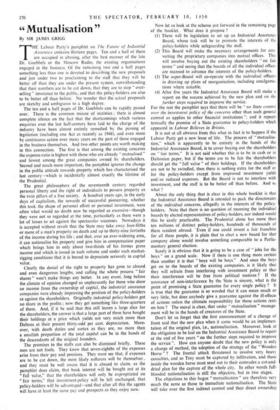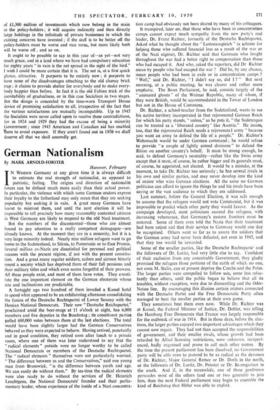6 6 Mutualisation "
By SIR JAMES GRIGG
THE Labour Party's pamphlet on The Future of Industrial Assurance contains thirteen pages. Ten and a half of them are occupied in abusing, after the best manner of the late Dr. Goebbels or the Moscow Radio, the existing organisations engaged in the business. Of the remaining two and a half pages
something less than one is devoted to describing the new proposals and just under two to proclaiming to the staff that they will be better off than they are under the present system, notwithstanding that their numbers are to be cut down, that they are to stop " over- selling " insurance to the public, and that the policy-holders are also to be better off than before. No wonder that the actual proposals are sketchy and ambiguous to a high degree.
The ten and a half pages of Dr. Goebbels can be rapidly passed over. There is the common misuse of statistics ; there is almost complete silence on the fact that the shortcomings which various enquiries over the last half-century have laid to the charge of the industry have been almost entirely remedied by the passing of legislation (including one Act as recently as 1948), and even more by continuous action over many years on the part of those engaged in the business themselves. And two other points are worth making in this connection. The first is that among the existing concerns the expense-ratio is highest with those who are already " mutual ised " and lowest among the great companies owned by shareholders. Second and much more important, the pamphlet ignores the change in the public attitude towards property which has characterised the last century—which is incidentally almost exactly the lifetime of the Prudential.
The great philosophers of the seventeenth century regarded personal liberty and the right of individuals to possess property as the twin pillars of a free society. A hundred years ago, in the early days of capitalism, the rewards of successful pioneering, whether this took the shape of personal effort or personal investment, were often what would no doubt now be regarded as excessive—though they were not so regarded at the time, particularly as there were a lot of losses to set against the spectacular successes. Nowadays it is accepted without revolt that the State may take away four-fifths or more of a man's property on death and up to thirty-nine fortieths of the income during his life ; and that, over an ever-widening area, it can nationalise his property and give him in compensation paper which brings him in only about two-thirds of his former gross income and which is issued in such volume and under such market- rigging conditions that it is bound to depreciate seriously in capital value.
Clearly the denial of the right to property has gone to absurd and even dangerous lengths, and calling the whole process " fair shares " won't make things any better. In any event, long before the climate of opinion changed so unpleasantly for those who drew an income from the ownership of capital, the industrial assurance companies were already improving the position of the policy-holders as against the shareholders. Originally indugtrial policy-holders got no share in the profits ; now they get something like three-quarters of them. And, if it be said that this still leaves a large slice for the shareholders, the answer is that a large part of these have bought their holdings at a price which yields not very mtich more than Daltons at their present thirty-odd per cent. depreciation. More- over, with death duties and surtax as they are, no more than a smallish proportion of the total capital can be in the hands of the descendants of the original founders.
The promises to the staffs can also be dismissed briefly. These men are not fools. They know that seven-eighths of the expenses arise from their pay and pensions. They must see that, if expenses are to be cut down, the most likely sufferers will be themselves , and they must be well aware that it is absurd to claim, as the pamphlet does claim, that book interest will be bought out at its " full value," that the shareholders will only be expropriated on " fair terms," that investment-policy will be left unchanged, that policy-holders will be advantaged—and that after all this the agents will have at least the same pay and prospects as they enjoy now. Now let us look at the scheme put forward in the remaining page of the booklet. What does it propose ?
(1) There will be legislation to set up an Industrial Assurance Board, whose task will be to promote the interests of the policy-holders while safeguarding the staff.
(2) This Board will make the necessary arrangements for con- verting the proprietary companies into mutual offices. This will involve buying out the existing shareholders " on fair terms " and seeing that the boards of all the individual offices are manned to advance the interests of the policy-holders. The super-Board will co-operate with the individual officers in drawing up plans of reorganisation, including amalgama- tions where suitable.
(4) After five years the Industrial Assurance Board will make a report on the success achieved by the new plan and on the further steps required to improve the service.
For the rest the pamphlet says that there will be "no State control over the investment policy of the concerns other than such general control as applies to other financial institutions "; and it repeats textually the promise of a State guarantee to policy-tolders which appeared in Labour Believes in Britain.
It is not at all obvious from this what in fact is to happen if the Labour Party get a new lease of life. The process of " mutualisa- tion," which is apparently to be entirely in the hands of the Industrial Assurance Board, is to cover buying out the shareholders on " fair terms." It is not said whether this is to be in cash or in Daltonian paper, but if the terms are to be fair the shareholders should get the " full value " of their holdings. If the shareholders are not to be swindled, then there is nothing extra for the staff or for the policy-holders except from improved investment yields and/or reduced expenses. But the Board is not to interfere with investment, and the staff is to be better off than before. And so what ?
About the only thing that is clear in this whole booklet is that the Industrial Assurance Board is intended to pack the directorates of the individual concerns, allegedly in the interests of the policy- holders. Note that there is no question of manning the individual boards by elected representatives of policy-holders, nor indeed would this be easily practicable. The Prudential alone has more than ten millions of distinct, policy-holders, hundreds of thousands of them resident abroad. ' Even if one could invent a fair franchise for all these people, it is plain that to elect a new board for that company alone would involve something comparable to a Parlia- mentary general election.
Surely it is obvious that it is going to be a case of " jobs for the boys " on a grand scale. Now if there is one thing more certain than another it is that " boys will be boys." And once the boys get on to the boards of the existing companies, is it likely that they will refrain from interfering with investment policy or that their interference will be free from political motives ? If the assurance of non-interference by the State is sincere, what is the point of promising a State guarantee for every single policy ? It is true that the guarantee is so worded that it can mean much or very little, but does anybody give a guarantee against the ill-effects of actions unless the ultimate responsibility for those actions rests on him ? The moral is clear, that under " mutualisation " manage- ment will be in the hands of creatures of the State. Don't let us forget that the first announcement of a change of front said that the new plan when it came would be an implemen- tation of the original plan, i.e., nationalisation. Moreover, look at the obligation to be laid on the Industrial Assurance Board to report at the end of five years " on the further steps required to improve the service ". How can anyone doubt that the new policy is only a change of method, the adoption of the strategy of the " Wooden Horse " ? The frontal attack threatened to involve very, heavy casualties, and so Troy must be captured by infiltration, and those inside the wooden horse must send out to their comrades a cut-and- dried plan for the capture of the whole city. In other words full- blooded nationalisation is still the objective, but in two stages.
The objections to this bogus " mutualisation " are therefore very much the same as those to immediate nationalisation. The State will take over the first indirect control and then direct ownership
of £1,300 million of investments which now belong in the main to the policy-holders ; it will acquire indirectly and then directly large holdings in the infinitude of private businesses in which the existing concerns have invested ; if the staff is to be better off the policy-holders must be worse and vice versa, but more likely both will be worse off , and so on.
It ought to be possible to say in this year of—as yet—not very much grace, and in a land where we have had compulsory education for eighty years " in vain is the net spread in the sight of the bird." I wish I could be more certain that it is. The net is, at a first quick glance, attractive. It purports to be entirely new ; it purports to have none of the disadvantages attaching to the old clumsy brick trap ; it claims to provide shelter for everybody and to make every- body happier than before. In fact it is the old Fabian trick of the inevitability of gradualness, or in this case Socialism in two stages. But the design is concealed by the time-worn Transport House device of promising satisfaction to all, irrespective of the fact that the various satisfactions are mutually incompatible. Up to 1945 the Socialists were never called upon to resolve these contradictions, for in 1924 and 1929 they had the excuse of being a minority Government ; since 1945 American and Canadian aid has enabled. Them to avoid exposure. If they aren't found out in 1950 we shall deserve all that we shall assuredly get.



































 Previous page
Previous page